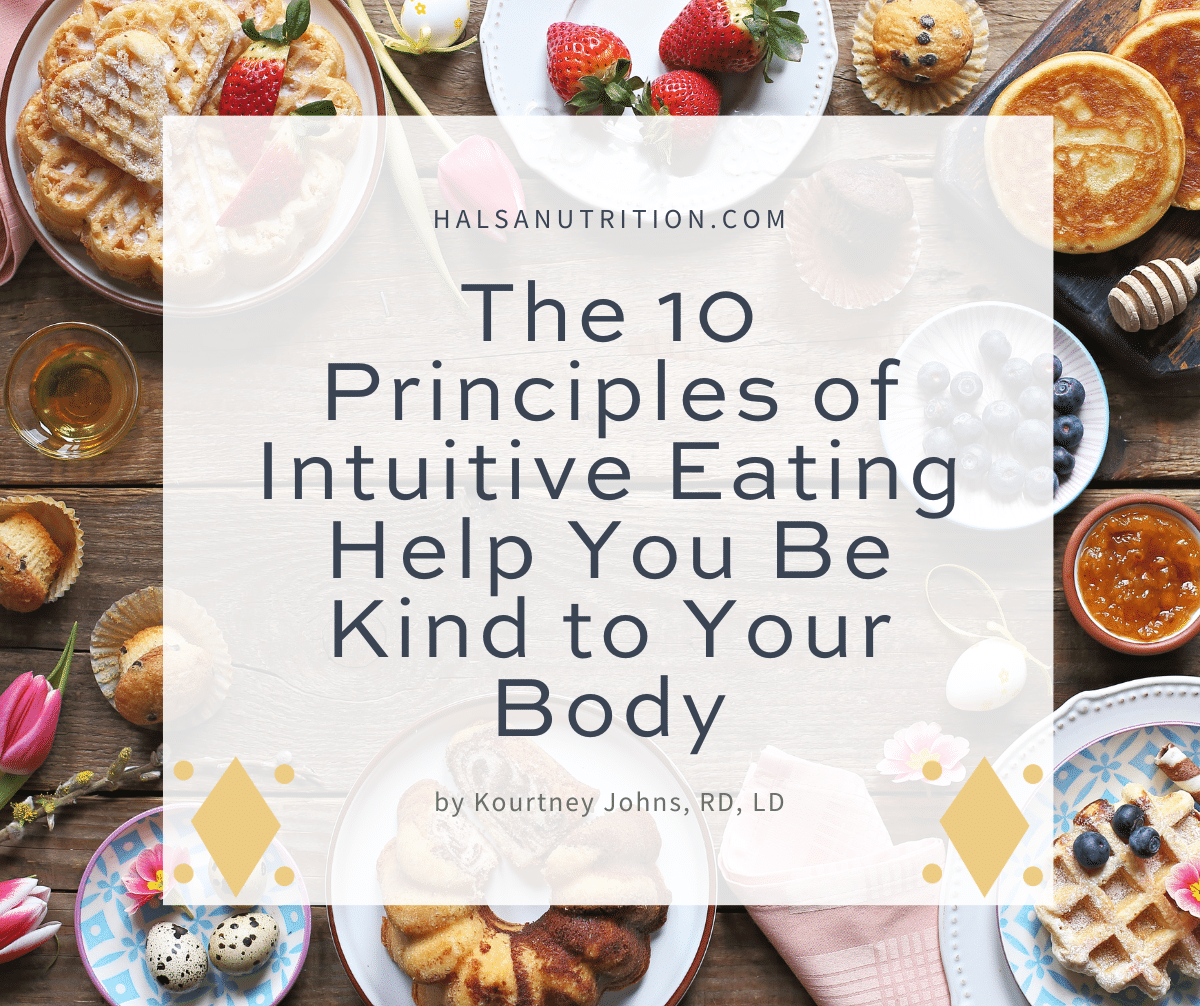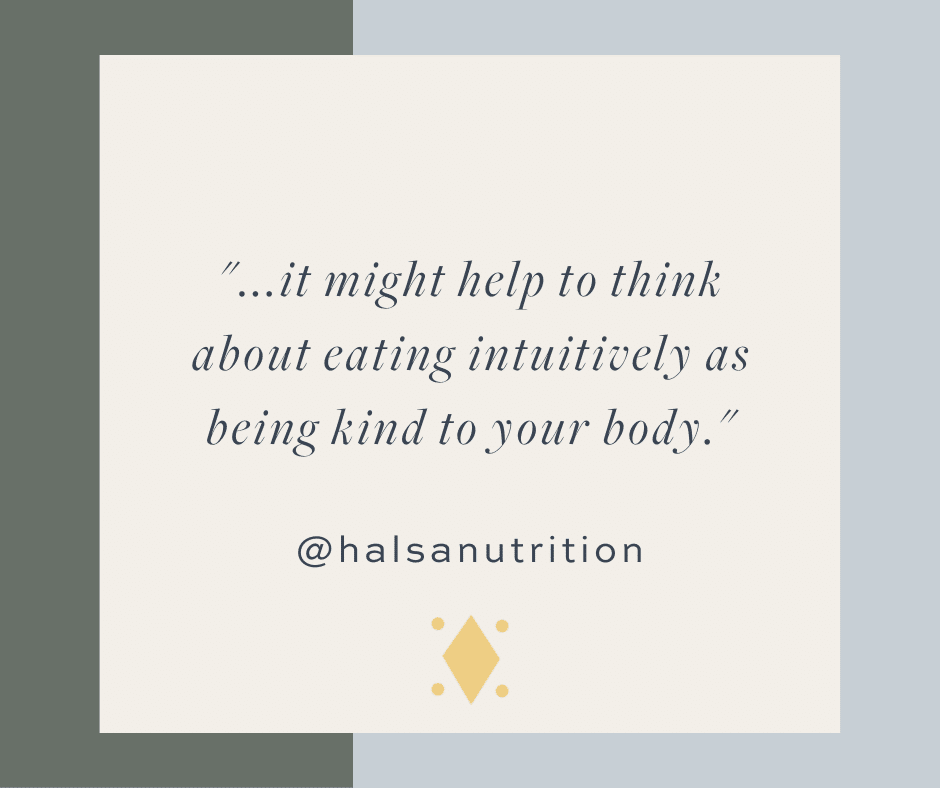
The 10 Principles of Intuitive Eating Help You to be Kind to Your Body
by Kourtney Johnson, RD, LD
Estimated reading time: 7 minutes
Intuitive Eating involves learning and unlearning certain information and habits. However, it’s also associated with better health outcomes, so it’s definitely beneficial to take time to understand it. A trick to better grasp the concept of this framework is to think of it as being kind to your body, as improving your health and meeting your body’s unique needs are some of the nicest things you can do for it!
Is it hard to wrap your head around exactly what intuitive eating is? Does it feel weird to think about not controlling your food intake with strict portion sizes? Are you wondering if doing that is actually benefiting your health?
If you are having these experiences or thoughts, remember that they’re normal as you learn more about this framework!
However, it might help to think about eating intuitively as being kind to your body, as it is associated with improved mental and physical health. Health benefits among intuitive eaters include lower triglycerides (fats in the blood), decreased blood pressure, higher HDL (good cholesterol), and increased self-esteem.(1)

Why is Intuitive Eating Correlated with Improved Health?
A key reason why intuitive eating is associated with better health is that its foundation is based on interoceptive awareness. Interoceptive awareness is the ability to feel physical sensations as they emerge from your body. It’s an experience that happens in the moment, such as hunger and fullness cues or the pounding of your heart. In fact, intuitive eating is the process of honoring your health by listening to and responding to your interoceptive awareness in order to meet your unique needs.
A common barrier to interoceptive awareness is diet culture, as it tells us we can’t trust our bodies, whether it involves distinguishing between hunger and thirst to knowing which foods are truly satisfying to us.(1)
The Importance of the 10 Principles of Intuitive Eating
The 10 principles of intuitive eating are significant, as they either strengthen interoceptive awareness or take away the obstacles to noticing and responding to the sensations you experience.
Those that improve interoceptive awareness are:
- Honor your hunger
- Respect your fullness
- Discover the satisfaction factor
- Movement-feel the difference
The principles that take away barriers to interoceptive awareness are:
- Reject the diet mentality
- Make peace with food
- Challenge the Food Police
- Cope with your emotions with kindness
- Respect your body
- Honor your health with gentle nutrition
The beauty of the 10 principles of intuitive eating is that they allow us to address intuitive eating step by step, instead of trying to learn and implement all of it at once.(1)

Gentle Nutrition, which is the 10th principle, is yet another way to be kind to your body. In fact, one of Maria’s clients said that her intuition would most likely guide her to choose a cookie over an apple. Maria explained to her client that it’s fine to have a cookie instead of an apple if that’s what she wants but suggested that she try thinking of intuitive eating as doing the kind thing for her body. This was an “a-ha” moment for her client. Finally, intuitive eating was resonating a bit more.
Doing the kind thing may sometimes mean savoring a cookie, other times it might be choosing an apple, and other times it might mean having both! This particular client had prediabetes, so Maria also shared how different foods and food combinations impact blood sugar and insulin response. She suggested pairing carbohydrate-rich foods like cookies with protein, (e.g., a glass of milk or some almonds) to help treat her insulin, blood sugar, and body cells with kindness. (Fiber is also helpful to include. More on that in a future post!)
Specific Health Outcomes of Intuitive Eating
Many studies have been done looking at the effects of intuitive eating. One study, completed by Tylka and Wilcox in 2006, involved 340 college women. It found that eating for physical instead of emotional reasons and relying on internal hunger and fullness cues to decide what and how much to eat positively impact psychological well-being, such as optimism, proactive coping, social problem-solving, and increased psychological resilience.(2)
The results of this study show how important someone’s ability to notice and respond to their emotions and internal hunger and fullness cues are, as being able to do so is related to well-being. The findings also validate four of the 10 principles of intuitive eating:
- honor your hunger,
- respect your fullness,
- cope with feelings with kindness,
- and reject the diet mentality.

Dieting is the Opposite of Being Kind to Your Body
By now you’ve likely heard about the effects of dieting. However, it might feel weird to consider that dieting isn’t a kind thing for our bodies, as we’ve heard for years that it is. Here are just a few examples of how it is not beneficial, though.
- Dieting slows down metabolism in order to more efficiently use the calories that are available.1
- Dieting increases binges and cravings to encourage us to eat more and get through this “famine” (which is how the body sees dieting).(1)
- Dieting is connected to eating disorders; one study found that people who dieted were eight times more likely to develop an eating disorder by age 15 than people who didn’t diet.(1)
- Dieting raises the risk of dying prematurely and developing heart disease, as shown by the Framingham Heart Study. The results show that regardless of people’s starting weight, people who yo-yo diet (when their weight goes up and down) have a higher overall death rate and two times the regular risk of dying of heart disease.(3)
Are You Convinced but Not Sure How to Get Started with Intuitive Eating?
Learning about intuitive eating can be a lot, but hopefully, you’re a bit more clear on the role of the 10 principles of intuitive eating and how they ultimately help with health improvement. This is why intuitive eating is all about being kind to your body. After all, how can we be any kinder than by actively working on having better health?
However, you might be confused about how and where to start with this framework, which is why Maria offers different services to best meet your needs and help you improve your relationship with food and your body. Schedule a free 15-minute consultation today!
Other Posts You May Like:
- How to Have Respect for Your Body and Improve Your Body Image
- What are the Factors of Good Health?
- 10 Non-Diet Books That Inspire
Sources:
- Tribole E, Resch E. Intuitive Eating. St. Martin’s Essentials; 2020.
- Tylka TL, Wilcox JA. Are intuitive eating and eating disorder symptomatology opposite poles of the same construct? J. Couns. Psychol. 2006;53(4):474-485. doi:https://doi.org/10.1037/0022-0167.53.4.474
- Lissner L, Odell PM, D’Agostino RB, Stokes J, Kreger BE, Belanger AJ, Brownell KD. Variability of body weight and health outcomes in the Framingham population. N Engl J Med. 1991;324(26):1839-1834. doi:10.1056/NEJM199106273242602
About the Author:
Kourtney is a registered dietitian who is passionate about sharing information related to intuitive eating and the harms of diet culture. She is from Minnesota but now lives in Spain, where she enjoys trying new foods and learning more about the culture there! In her free time, she likes to read, go to the beach, spend time with friends and family, and travel.
This article was edited and reviewed by Maria Adams, MS, MPH, RDN, LDN, a registered dietitian and Certified Intuitive Eating Counselor. Maria takes a weight-inclusive approach and helps individuals rediscover the joy of food by helping them heal from chronic dieting and disordered eating. She holds a Bachelor of Science Degree in Nutrition Science, a Master of Science in Nutrition Communication, and a Master of Public Health.
Leave a Reply